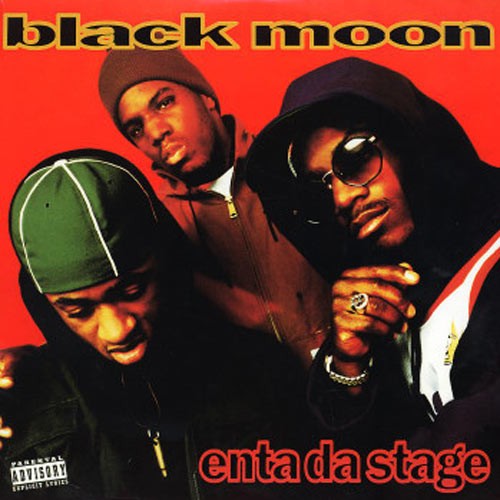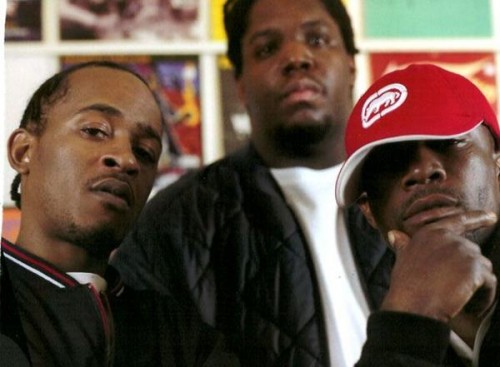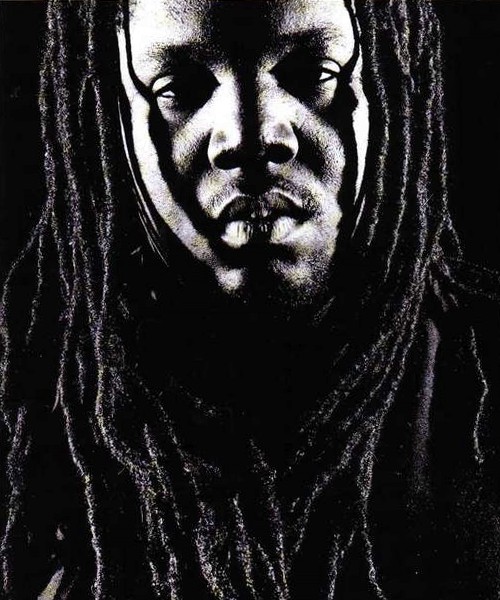Evil Dee

Hip-Hop Core: So, let's start from the very beginning. Is it true that you became a DJ because you saw that it was making your brother popular?
Evil Dee: Yeah. You know, my older brother Mr. Walt, I used to see him DJing and being a younger brother I was like "Yo, he can't get all of the attention, I gotta get some attention too". So I started DJing cos' he started DJing.
HHC: Do you remember your first block parties in Brooklyn? Can you talk about it?
E: Wow, the block parties back in the days in Brooklyn, it was crazy. It was like, you just heard this monster beat. As a DJ, I was just attracted to the beat. At block parties you had the people dancing, the rappers who rhymed, but I was the dude who just stood there and watched the DJ. It's funny because Bushwick, Brooklyn was known and we had some of the illest systems man, you know what I'm saying? It was dope. But it was all about that beat, I used to travel looking for this beat, looking for this block party, all the time. When Saturdays came around in the summer, I was looking for a block party, and I would walk for like miles just to listen to music.
HHC: You worked in a record store in the very early nineties. What kind of memories have you kept from this experience?
E: Well, I worked in a couple of record stores. When I worked around my way, the name of the record store was Knickerbocker Records, shout out to Bushwick, Brooklyn. At Knickerbocker Records I learnt how to really sell a record. I saw what people were buying, I saw how you can make people buy stuff they don't really want to buy. Then I left there and went to Beat Street Records in downtown Brooklyn, and there I learnt about big stores, how to order records, how to do product placement in stores. Then I left there and worked at Brooklyn with my man [DJ Johnny T], and he taught me how to sell a mixtape, he was the first one I saw with the machines. I mean, I was making mixtapes way before I got to that store, but I was selling them around my way and round there I was selling few hundred. It was in 86-87 that I started selling my mixtapes, and we were selling a whole bunch of them. When I bumped into [Johnny T] at the last the record store where I worked, he was the first I saw who had the duplicating machines. These machines could make twenty five tapes in one shot. He was also the first one I'd seen selling tapes to everybody, shipping them off worldwide. He taught me that game. When I left there I'd learnt that. Also, when you sell mixtapes, it's the same as selling records. So I also learnt how to run a record label without even knowing it. All those experiences from all those different record stores taught me how to put together everything for the record store.
HHC: In the Beatminerz productions, you use a lot of filters and warm basses. When I listen to your work I really get the feeling that Jamaican music was and is a major influence for you.
E: It is. Jamaican music is an influence in hip hop, period. DJ's come from the Jamaican DJ's, Kool Herc was one of the first DJ's, and he's Jamaican, he got that from seeing the Jamaican sound systems back in Jamaica. My family, we're a mixture. We're Spanish and Jamaican. So my parents would always bring these Jamaican records home, and they would bring home James Brown. So eventually what happens is, when you grow, you emulate what your parents do. So my music sound is what I heard growing up which was hard bass and hard drums.
HHC: Which are the producers in hip hop and in other styles of music who influence you the most?
E: Man, you have producers like Quincy Jones, Stevie Wonder, George Clinton, Hank Shocklee and the Bomb Squad, DJ Premier. You know, coming up, there were a lot of different people that I listened to. It may have been that person who made that one record, but there's a lot of people. Those are the people who stick out right now.

HHC: How did the members of Black Moon come together?
E: Put it like this, I was doing a talent show because at the time, me and Crazy DJ Bazarro were enemies, because we were the only ones that were making music in our high-school, we were battling. I was putting together a talent show. My man 5 FT., at the time he was a dancer. So I stepped to him and I was like "Yo, I'd love you to dance for the show man", and he was like "Yeah, but I gotta bring my partner". So I said "Bring your partner to my crib and we'll talk". And that's how I met Buckshot, Buckshot was his partner.
HHC: He was already rapping at the time?
E: No, he was dancing at the time. He was rhyming, but he wasn't Buckshot yet, he wasn't as dope as he is now, and he just took it upon himself to become dope. Even Five grew into 5FT, and I grew into Evil Dee. You have to grow up, and we grew into our styles, cos' we were making demos at the time that were ok, but it wasn't no record material. It took time for us to grow into Black Moon.
HHC: So you're talking about late eighties?
E: Late eighties, early nineties, from '86 to '91. And then in 1992, I guess that's when we finally got it, because that's when everything started coming together.
HHC: Would you say that the group had more of a commercial success or more of a success with the hip hop heads?
E: Well you know, commercial success I really don't care about, because commercial comes and goes, it's a fad. Did we sell records? Yeah. But we're a group that's for the heads. Black Moon is an underground group. If the commercial cats decide to have a listen then they can, I don't care, if you like it you like it, I don't care who you are. But what we do is basically for the underground. We're not going to sit around and sell out, we don't need big cars and to top it off what I said to everybody a long time ago is you don't need to sell out to make money. We make money doing what we do. Like Jay-Z has got money but at the same time, cats like me have got money too, so it doesn't matter.
HHC: In the early and the mid nineties, there were a lot of things going on in the New York hip hop scene, with D&D, Tribe, Premo, Large Professor, The Beatnuts, Da Beatminerz. Can you talk about the feeling that you kept from this era?
E: The thing I like about that era is that everyone was cool, it was like a crew. We would come and check each other out. Everybody was cool and at the same time we all had the same mission, to make good records. Nobody was thinking about selling crazy amounts of records. Now it left from wanting to sell good records to "we've gotta sell mad records", and that's where I say the music fell off, when people started to sit and think about how much they wanted to sell. We were sitting around thinking "yo, I gotta make that record so that cats around my way be like "yo, that's that joint!", you know what I'm saying? That's when it was real. Now, you've got a lot of cats out there who are fraudulent, a lot of cats who are fake. They're not doing hip hop because they love hip hop, they're doing it because they want to be a millionaire. But when you go into something thinking like that, that you want to get rich, you stay broke.

HHC: You're well recognised for your mixtape works. Today, the cassette format is almost dead, so how do you proceed?
E: Easy, of course, everybody's downloading so what do you do? You do a podcast. Or you make a CD. Either way, it's digital. In order to be able to fight the war, you have to be able to use the weapons of choice. A lot of hip hop cats get mad because "Oh, you're using Serrato?", or "you're using CDJs", and this and that. At the end of the day don't be stupid, you're going to be that fool that's sitting at home, cutting on something that's going to be eventually fazed out. The thing about hip hop, what we always did was that we took different things and we learnt how to use it to our advantage. The turntable was not made for a DJ to scratch like that, but we forced the turntable company to make a DJ turntable, we were taking old turntables and scratching. The SP 1200 machine was not made for sampling hip hop or for making hip hop records, it was made to sample percussion. We took it and flipped it, and that's what we always did in hip hop. Look at Pro Tools, it wasn't made to record music, Pro Tools was made for radio stations, to record commercials. So we have to learn to adapt the technology. I always tell people, it don't matter what I use, I'm always going to be nice, and I'm always going to be hip hop.
HHC: Aside from your brother and you, who is still a member of the Beatminerz?
E: That's it. Evil Dee and Mr. Walt. And maybe my daughter and Walt's son, but that's it.
HHC: Because back in the day, you used to be…
E: Yeah, well we had different crew members, we had my man Chocolate Tye, and he retired, my man Rich Black, he didn't like the industry so he retired, and Baby Paul. I can't comment on that right now, but Baby Paul left because he wanted the commercial. But I'm saying, if that's what he wants, let him go get that, you know what I'm saying? Cause maybe that's what he's supposed to do in life. We all have things to do in life, somehow it was written that I would be sitting here talking to you, and I'm a firm believer in that.
HHC: When you're working with people like De La Soul or Busta Rhymes, what would be the differences compared to when you're working with indie hip hop cats like Apani or Doujah Raze?
E: It's no difference to me. I treat underground unsigned artists like I treat a signed artist. You're gonna get the same thing. I'm gonna sit down with you, we're gonna talk about how we're gonna put this record together. If you live in New York, you're coming to my studio. If you don't live in New York, I may send you the track or I might fly out to come to your studio, but everyone gets treated the same. The one thing I will say is, what I like about the independent cats is that they want it more. They're more hungry for it. For me, working with the independent cats, they're going to come at you and be like "yo, I need this, this and this". Commercial cats are gonna come at you cause you're hot, and they're just gonna take what you give them.

HHC: What are you listening to at the moment?
E: Nothing. A lot of independent records are in my i-pod. I like Madlib, a lot of unsigned cats that sell CDs on the corner in New York. I'm not happy with what's going on in music right now. I listen to a lot of funk and soul. I actually listen to a lot of dance music too, believe it or not, a lot of people shun dance music and think it's not hot, no, music is music. Don't get me wrong, I listen to dance music that has soul, all that stuff with the noise, I'm not checking for you. Back in the days, DJs played everything, and that's what we bring forth, we play for the music lovers, we don't play only for the hip hop heads or this that or the other, we play for everybody.
HHC: What are your most recent productions and what are your plans?
E: 5FT from Black Moon never had a solo album, so we're working on a joint, it's called the 5FT and Evil Dee project right now, cos' Buckshot had many solo albums but Five never had one cause he always went to jail. At the same time I'm working on Crazy DJ Bazarro on his album, we just did a track with Talib Kweli and I think Q-Tip's gonna be on it too, I'm working on a lot of things right now.
HHC: You recently did a track with Akrobatik, 'Soul Glo'.
E: Yeah, I've done so many things recently I forget, sorry about that, but I love that track. I'll tell you a behind the scenes story about that one, I did the track and we were mixing it, and Fat Beats comes to me and is like "Yo man, we want the track to be full of bass", so I said "Oh, ok no doubt!" so I mix the track like I usually mix the track. They call me back like three days later and they're like "yo, there's too much bass in the track!", our track was rattling every other track that was on there! So I had to do another mix where I had to lower the bass, and it's funny cause that track still has a lot of bass, so imagine how I had it before. That's one thing that hip hop is missing right now and that's the beat. If you listen to the popular records that are out now, there's no drums in it, no bass and it's like "that's cool if that's you, but hip hop is all about that beat", it's all about that boom boom bap boom boom boom boom bap. Also, DJs are not cutting on their records the way they're supposed to, so we're bringing that back too. The only DJ I can think of off the top of my head that represents that is Premier. A lot of DJs aren't cutting and scratching like they supposed to. So if you call yourself hip hop, you have to have those elements, and even MCs out there, you're talking about your rap and your rhymes but if you don't have a DJ you are not hip hop. Yo, Jay-Z has a DJ, Nas has a DJ and these are commercial dudes. I know rock groups that have a DJ so if you're a rapper and you don't have a DJ don't call yourself hip hop, call yourself a rapper. No doubt.
Interview by Hugues Marly
August 2008